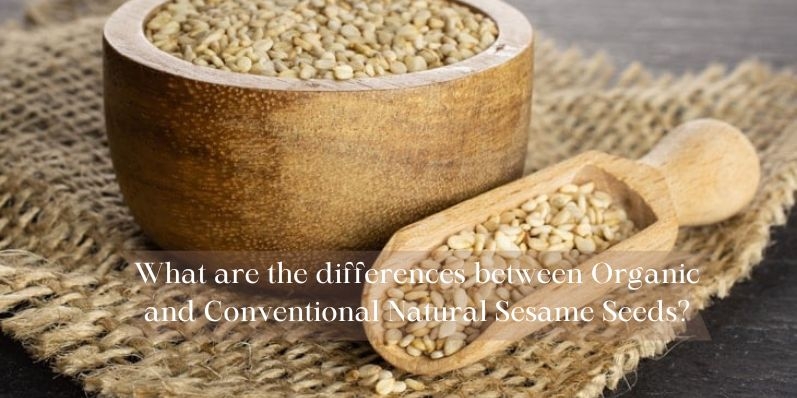
27-01-2024
Differences between Organic and Conventional Natural Sesame Seeds?
- Admin
Introduction
Sesame seeds, a staple in various cuisines worldwide, come in two distinct varieties: organic and conventional. The choice between these options goes beyond the label, extending into farming methods, production processes, and their impact on both the environment and seed quality. In the context of the USA, understanding the disparities between organic and conventional natural sesame seeds is essential for consumers seeking to make informed decisions about their food choices.
Contrasting Farming Methods
One of the fundamental distinctions between organic and conventional sesame seed production lies in the farming methods employed. Organic farming emphasizes a holistic approach, steering clear of synthetic pesticides, herbicides, and genetically modified organisms (GMOs). In the USA, organic sesame seeds are cultivated in accordance with stringent regulations that prohibit the use of synthetic chemicals. Instead, organic farmers rely on natural fertilizers, crop rotation, and other sustainable practices to enhance soil fertility and mitigate environmental impact.
Conversely, conventional sesame seed farming often involves the use of synthetic chemicals to boost crop yield and control pests. These methods, while efficient in maximizing production, may leave residual traces of chemicals in the seeds. The USA, being a significant player in conventional agriculture, follows strict guidelines to regulate the use of such chemicals, but concerns about their impact on human health and the environment persist.
Organic vs. Conventional Sesame Seed Production
The production processes for organic and conventional sesame seeds diverge in critical aspects. In organic farming, the emphasis is on fostering biodiversity, maintaining soil health, and eschewing synthetic additives. As a result, organic sesame seeds are often cultivated in smaller batches, and the production timeline may be longer compared to conventional methods.
Conventional sesame seed production, on the other hand, leans towards large-scale farming practices. The use of synthetic inputs allows for quicker harvests and higher yields, meeting the demands of a growing population. However, this efficiency may come at a cost, potentially compromising the nutritional profile of the seeds and impacting the overall ecosystem.
Impact of Farming Techniques on Seed Quality
The disparity in farming methods directly influences the quality of sesame seeds. Organic sesame seeds are renowned for their rich nutritional content and robust flavor profile. The absence of synthetic chemicals in the cultivation process contributes to the preservation of the seed's natural essence, resulting in a product that is not only healthier but also environmentally sustainable.
Conventional sesame seeds, while meeting global demands, may face challenges in maintaining the same level of nutritional integrity. The reliance on synthetic inputs might compromise the seeds' nutritional value, leading to concerns about potential pesticide residues in the final product. The USA, in its commitment to food safety, continually refines regulations to address these concerns and ensure consumer well-being.
Sustainability in Organic versus Conventional Farming
Sustainability is a key consideration in the choice between organic and conventional sesame seeds. Organic farming practices prioritize soil health, water conservation, and biodiversity, promoting a more harmonious relationship between agriculture and the environment. In the USA, organic sesame seed cultivation adheres to these principles, contributing to the overall sustainability of the agricultural sector.
Conventional farming, while efficient in meeting the demands of mass production, may face challenges in terms of sustainability. The use of synthetic inputs and large-scale monoculture practices can lead to soil degradation, water pollution, and a loss of biodiversity. The USA, recognizing these challenges, implements conservation programs and sustainable farming initiatives to mitigate the environmental impact of conventional agriculture.
Making Informed Decisions between Organic and Conventional Sesame Seeds
As consumers in the USA navigate the choices between organic and conventional sesame seeds, it is crucial to weigh the factors that matter most to them. Organic options offer a more sustainable and environmentally friendly choice, with the added benefit of potentially higher nutritional content. Conventional sesame seeds, on the other hand, provide efficiency in meeting global demands but may raise concerns about chemical residues and environmental impact.
Ultimately, the decision between organic and conventional sesame seeds in the USA rests on personal values, health considerations, and environmental consciousness. By staying informed about farming methods, production processes, and their implications, consumers can make choices that align with their priorities, contributing to a more sustainable and health-conscious food landscape.